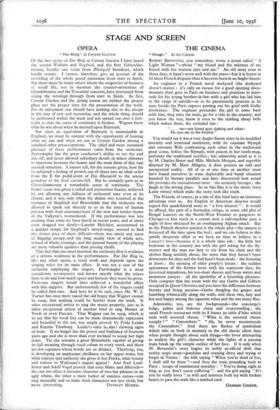THE CINEMA
" Orage." At the Curzon
ROBERT BROWNING, you remember, wrote a poem called " A Light Woman "—about " my friend and the mistress of my friend with her wanton eyes and me." An old story even in those days, it hasn't worn well with the years—but it is better in its latest French disguise than it has ever been in an Anglo-Saxon.
An engineer in a French naval dockyard (the dockyard doesn't matter : it's only an excuse for a good opening docu- mentary shot) goes to Paris on business and promises to inter- cede for his young brother-in-law with a girl who has led him to the verge of suicide—or so he passionately protests as he runs beside the Paris express panting out his grief with Gallic irretieence. The engineer persuades the girl to come back with him, they miss the train, go for a ride in the country, and you know the rest, know it even to the tinkling sheep bells which waken them, the secluded inn :
. . . see—my friend goes shaking and white : He eyes me as the basilisk."
You would say it was a very Anglo-Saxon story in its muddled morality and irrational sentiment, with its constant Nymph and constant Wife confronting each other in the traditional great scene, before the Nymph, with poison in her tooth-mug, performs the traditional sacrifice; but admirably acted as it is by M. Charles Boyer and Mlle. Michele Morgan, and superbly directed by M. Marc Allegret, it does possess an odd and unexpected reality. All of us at one time or another must have found ourselves in some deplorable and banal situation haunted by literary parallels and have discovered how actual life provides the untraditional twist : the untimely hiccups ; the laugh in the wrong place. So in this film it is the twists (very Latin twists) which make the story look hie truth.
The French, of course, in a tale of this kind have an immense advantage over us. An English or American director would regard this quadrilateral story as " a love interest " : it would be affixed, like part of a Surrealist collage, to some odd plot of Bengal Lancers on the North-West Frontier or gangsters in Chicago—a kiss stuck in a corner next a sub-machine gun, a night of love obscured by an overlapping Afghan attack. But to the French director passion is the whole plot—the camera is focussed all the time upon the bed ; and we can believe in this untidy desperate affair as we have no time to believe in a Lancer's love—because it is a whole time job : the little hot bedroom in the country inn with the girl asking for the fly- swatter and the man too lazy to stir from his chair and the clothes flung untidily about, the sense that they haven't been downstairs for days and the bed hasn't been made : the listening at doors : the opening of other people's letters : the sudden appearance of the former lover with his scarecrow face, his hysterical impudence, his too-short sleeves and bony wrists and immature jumper : all the ignobility of a besetting pleasure. Only compare that inn room with the one Garbo and Gilbert occupied in Queen Christina and you have the difference between literary and living passion—Garbo dangling the grapes and fumbling whimsically along the walls, and these two, lazy and hot and happy among the cigarette ashes and the too many flies.
Admirable, too, are the backgrounds—the concierge's lodge, palms and hideous china and overcrowding ; the small French restaurant with its 8 francs so table d'hote which ends with assorted cheese. " What is the assorted cheese tonight ? " " Camembert." " Ah, he never recommends the Camembert." And there are flashes of symbolism which take us back in memory to the old classic silent days when people thought about such things—the lover attempting to analyse the girl's character while the lights of a passing train break up the simple outline of her face. It is only when M. Bernstein's story begins its noble sacrificial drift that reality seeps away—gondolas and evening dress and trying to forget in Venice : the wife saying " When you're tired of her, I shall still be there "—and then the train pounding back to Paris : scraps of sentimental morality : " You're doing right as long as you don't cause suffering " : and the girl saying "It's you he really loves " as wife and mistress both try with broken hearts to pass the male like a marked card.
GRAHAM GREENS.










































 Previous page
Previous page